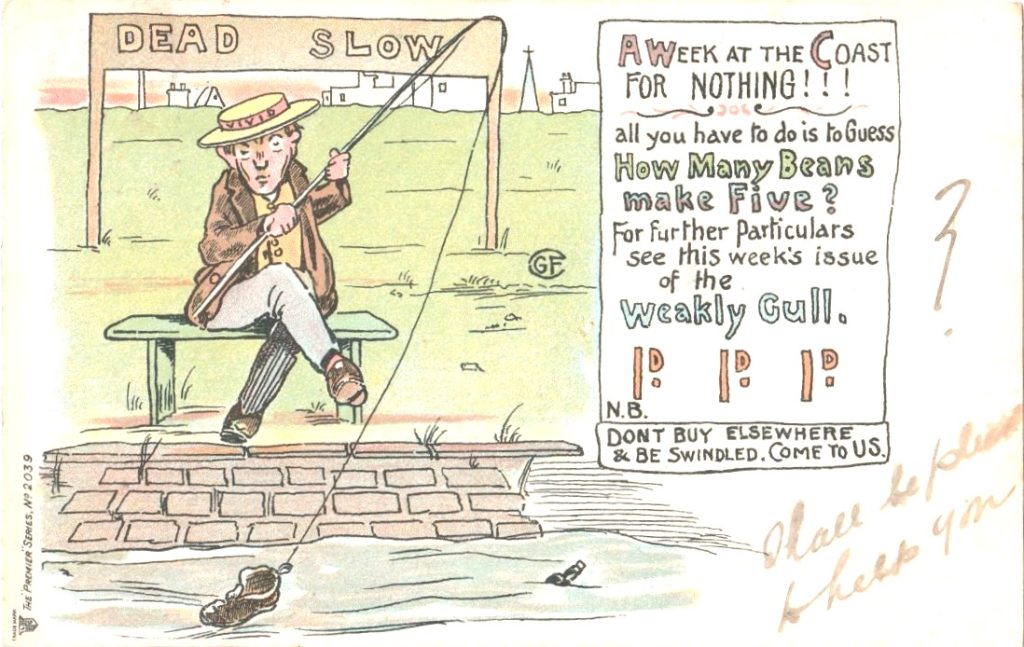Bob Teevan
A Week on the Coast
The concept of a “comic” card is that it be amusing. I will go further than that and suggest that it be instantly amusing, and that no great thought be required to see the humor. There are however factors which influence the humor and among these are its topicality, time, or place. For example, I saw a clever Facebook funny this morning where the J. P. Hartley character from the 1980s Yellow Pages television adverts is phoning the bookshop and asking for a copy of How do you complete your tax return by Nadhim Zahawi.
Now I found this post funny although it is so perhaps only to UK readers who remember the Yellow Pages advert, and even at that the humor will reduce over time as the public forgets the possible offences of the current Chairman of the Conservative party. In 100 years time the reader will have to consult the newspaper archives to understand the humor. It can be the same with comic cards although I find it enjoyable to attempt to work out the humor.

I recently bought the card featured today and I did so because the illustration is by George Fyffe Christie. It was published by William Lyon of Glasgow in the Premier Series brand and is an undivided back postcard postmarked in Blackpool on August 11, 1903.
The illustration is quite busy and it’s not immediately apparent what the title of the card is. The illustration is of a man who is wearing typical holiday apparel of the era and who is sitting on a bench, fishing. Behind him is a grassy area and a town. There is also a sign with the instruction DEAD SLOW. Other comments on the card infer that the angler is enjoying a week at the coast although the “Dead Slow” sign is an instruction more usually associated vessels in inland canals and the debris in the water are items which are normally found in slow moving canal waters.
It is easy to assume that the angler is a holidaymaker who expected to be enjoying the fresh air of the seaside and while he could be expecting to pull fish from the sea, he is pulling old boots from a canal.
Why? Well, it seems certain that our nattily attired angler has purchased his holiday from a classified Ad (the early 20th century equivalent of an online purchase) and what was offered (A week at the coast for – next to – nothing) has transpired to be, at best, a false promise, and at worst, a con.
There is no doubt, the angler is a foolish individual who has been duped. The suggestion is that the holiday was to be cheap and would cost no more than “Five Beans.” Again, it is no coincidence that this is the sum suggested as received by young Jack in exchange for the family cow. Jack, of beanstalk fame, was duped into selling his cow for beans … much to the dismay of his mother.
Further particulars are to be available in this week’s issue of the Weekly Gull. (It was probably quite gullible to look for this publication in the newspaper archive, although on further consideration, indeed it only existed in the minds of the gull-ible.
The final line in what is styled a classified add instructs the reader “Don’t buy elsewhere & be swindled. Come to us” … and let us swindle you.
So, there is a bit of work required to see the humor.
***
I’m not sure that this card was intended as a comic card and it wouldn’t surprise me if it was intended for – or is part of – a set of cards of adages, morals, or general rules of life. Around the same time as this card was published the artist was supplying both Wrench and Miller & Lang with illustrations for three separate series of postcards under the titles of Popular Songs Illustrated, Addled Ads, and Agony Column. The cards for each of these series would take a popular song or a typical classified advert, or agony column enquiry and would interpret the words in a way not initially intended, and to partner this with a humorous illustration. It is for this reason that I would have expected to find this card in a set perhaps named Morals to Live By and with an individual title of If something looks too good to be true then it probably is too good to be true.
My readers may wonder why I spent money buying the postcard when I could have just solved the question from memory. To them, I say, to put the purchase into context, I paid little more than the price of a daily newspaper which I used to buy just to do the crossword.
On the card, the purported publication’s name is Weakly Gull (as opposed to “Weekly”), which provides further evidence that the message is not to be taken seriously.